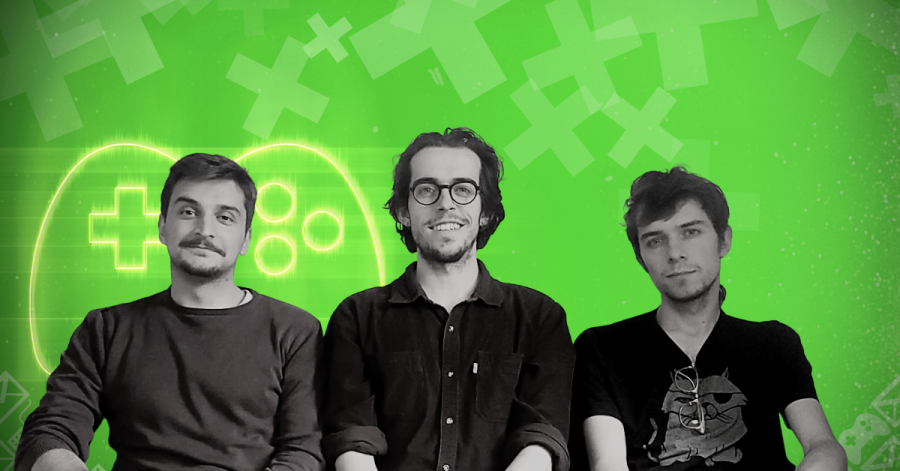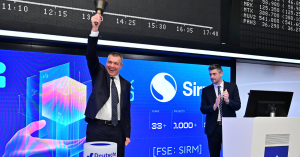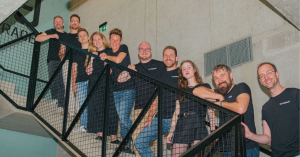- INSAIT’s first deep tech spin-off, Martian Lawyers Club (MLC), secures $2.2M in pre-seed funding to innovate the gaming industry.
- MLC aims to reimagine conventional games by using machine-learning technology for personalized experiences.
- INSAIT’s unique approach to mentorship plays a crucial role in the success of MLC and sets the stage for Bulgaria and the wider CEE region to level up with the proven models of big Western countries.
The innovation landscape in Central and Eastern Europe (CEE) marks a significant stride as INSAIT’s pioneering deep tech spin-off, Martian Lawyers Club (MLC), secures a notable pre-seed investment of $2.2M. Leading the funding round is Fly Ventures of Switzerland, joined by Germany’s System.One, and Amar Shah, distinguished co-founder of tech ventures such as Wayve, Charm Therapeutics, and Dhyan Ventures.
INSAIT’s model: shaping the future of CEE
At the heart of this achievement lies INSAIT, a research organization born from the collaboration between ETH Zurich and EPFL, and that is structured as a special unit of the Sofia University “St. Kliment Ohridski” (Bulgaria). Rooted in the ethos of cultivating CEE’s deep tech ecosystem, INSAIT serves as a crucible for spawning innovative startups, drawing inspiration from the models of eminent institutions like MIT and Stanford.
“The best deep tech incubators in the world are the computer science departments of strong universities, because that is where the strongest people are and it is where one constantly plays with new ideas. Further, it is where people are most familiar with state-of-the-art, thus it is clear what contribution the startup will make to this state-of-the-art. For the first time in history, INSAIT is now transferring this model to Bulgaria and the region,” Martin Vechev, Architect of INSAIT comments for The Recursive.
INSAIT’s approach to mentorship and support from AI scientists and serial entrepreneurs evidently enhances the growth prospects of the startups it incubates.
“There are a number of key steps to creating a strong deep tech startup, ranging from technical know-how, to structuring the company, fund raising, collaborations with INSAIT, and many more. INSAIT is instrumental along each of these steps as the people who drive it have tremendous experience with the entire process and have co-founded many successful deep tech companies. Thus, along each of these steps, INSAIT is able to help potential startups and the people who create them,” Vechev explains.
Martian Lawyers Club: personalized gaming through AI innovation
Within a global gaming realm valued at over $200 billion, inhabited by more than 3 billion players worldwide, MLC embarks on a mission to innovate the essence of conventional games. Armed with advanced machine-learning technology (in essence advanced generative AI techniques for Gaming), MLC envisions a landscape where game developers seamlessly incorporate personalized experiences.
“Interactive experiences have been quickly overtaking traditional entertainment in the past decade, and with an increased investment in virtual reality and user-generated content platforms, this trend will surely continue well into the next decade. While AAA (blockbuster) games have achieved visual immersion levels that rival reality itself, and high-quality simulations nowadays allow for incredibly complex worlds to emerge, game design innovation has stagnated in comparison to the revolution of the ‘90s and early ‘00s,” MLC’s CEO Kamen Brestnichki shares in the press release.
Advancing beyond static content
In the past few years, innovative technologies have been changing the dynamics of the gaming industry. The latest evolution of generative AI, which holds the promise of transcending the boundaries of “static content,” has captured the attention of the gaming realm. This technology has laid the groundwork for the emergence of several pioneering startups, dedicated to automating the creation of intricate in-game assets, ranging from complex images to immersive 3D models.
Notably, industry behemoths such as Unity and Roblox have embarked on their own journeys of exploration, delving into AI-driven tooling products. They’re augmenting developer platforms with innovative code-completion features, underscoring the pivotal role of AI in streamlining the game development process. Additionally, major AAA studios are embracing generative AI to propel narrative generation, infusing their titles with procedural stories that dynamically respond to player actions.
It’s within this swiftly evolving context that Martian Lawyers Club (MLC) has set its sights on a profound challenge.
“A game can be split into two pillars: content and systems. While the primary focus in the industry is currently on generating content, creating new types of games requires addressing systems as well. Systems are the verbs of games, they define how players interact with the game world. Our goal is to offer game developers a way to generate these systems in-game, a possibility that was unthinkable just a couple of years ago. We want to help developers unlock this new potential,” Levi Fussell, Chief Technology and Product Officer of MLC explains in the press release.
Collaborative pathways: INSAIT’s impact on future spin-offs
MLC’s investment milestone serves as a testament to the collaborative potential of INSAIT. As its echoes resonate across the CEE innovation landscape, aspiring founders find themselves at the threshold of transformative opportunities. The precedent set by MLC’s partnership with INSAIT paves the way for future innovators to embark on a similarly impactful collaborative journey.
“For MLC specifically, INSAIT helped the co-founders shape the idea and also the entire pitching and fundraising efforts, as professors at INSAIT are also successful tech entrepreneurs and have a very large VC network. To strengthen this relationship, the INSAIT foundation holds a small equity in MLC, which is important as funding from the foundation is used for scholarships for Bulgarian students and other scientific aims, thus closing the loop between science and startups. With MLC, INSAIT has validated that the model now works in Eastern Europe and we expect other startups to also be created from INSAIT following the same model,” Martin Vechev adds.
As these (future) budding ventures flourish within INSAIT’s ecosystem, they have the potential to contribute to a fortified deep tech landscape in the entire CEE region.








